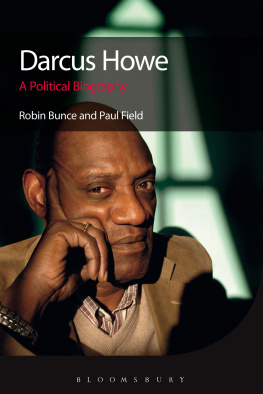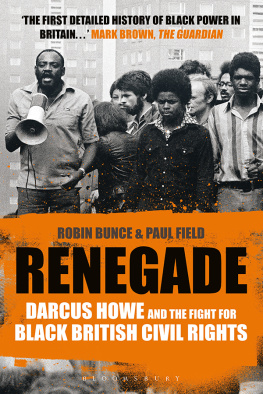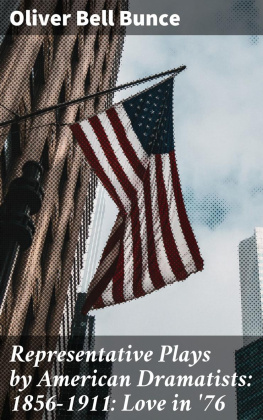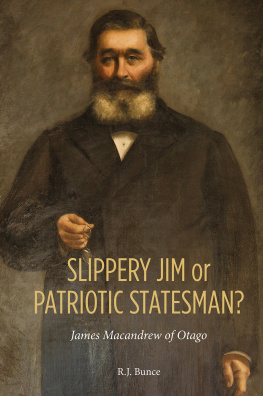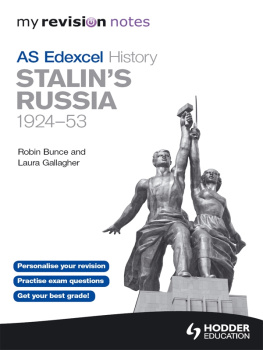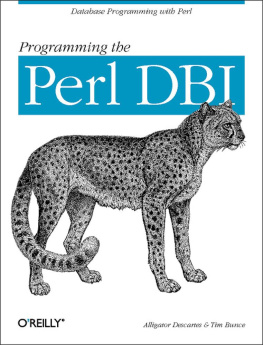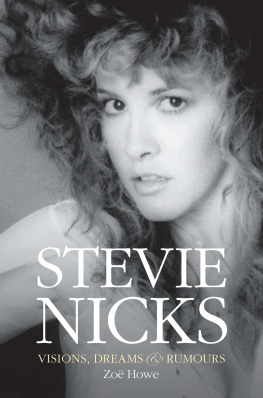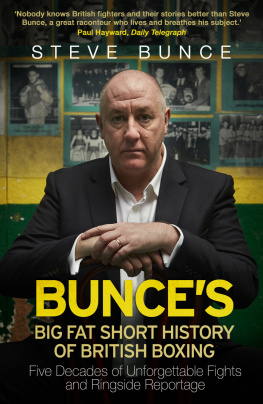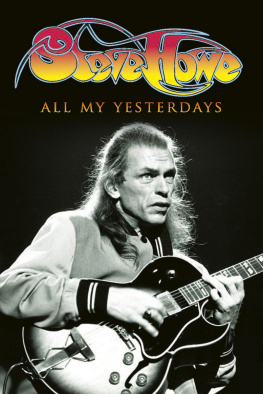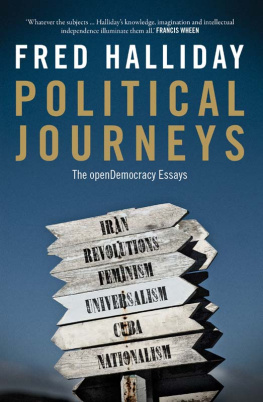Bunce - Darcus Howe: A Political Biography
Here you can read online Bunce - Darcus Howe: A Political Biography full text of the book (entire story) in english for free. Download pdf and epub, get meaning, cover and reviews about this ebook. year: 2013, publisher: Bloomsbury Publishing, genre: Politics. Description of the work, (preface) as well as reviews are available. Best literature library LitArk.com created for fans of good reading and offers a wide selection of genres:
Romance novel
Science fiction
Adventure
Detective
Science
History
Home and family
Prose
Art
Politics
Computer
Non-fiction
Religion
Business
Children
Humor
Choose a favorite category and find really read worthwhile books. Enjoy immersion in the world of imagination, feel the emotions of the characters or learn something new for yourself, make an fascinating discovery.
Darcus Howe: A Political Biography: summary, description and annotation
We offer to read an annotation, description, summary or preface (depends on what the author of the book "Darcus Howe: A Political Biography" wrote himself). If you haven't found the necessary information about the book — write in the comments, we will try to find it.
Bunce: author's other books
Who wrote Darcus Howe: A Political Biography? Find out the surname, the name of the author of the book and a list of all author's works by series.
Darcus Howe: A Political Biography — read online for free the complete book (whole text) full work
Below is the text of the book, divided by pages. System saving the place of the last page read, allows you to conveniently read the book "Darcus Howe: A Political Biography" online for free, without having to search again every time where you left off. Put a bookmark, and you can go to the page where you finished reading at any time.
Font size:
Interval:
Bookmark:
Darcus Howe
Also available from Bloomsbury
Identity in the Shadow of Slavery , edited by Paul E. Lovejoy
Never Been a Time: The 1917 Race Riot That Sparked the Civil Rights Movement, Harper Barnes
In memory of C. L. R. James
Darcus Howe
A Political Biography
Robin Bunce and Paul Field

Contents
Writing this book has involved many wonderful experiences. Hours in archives are, of course, the historians delight, and we thank the staff at the National Archives, the Institute of Race Relations, the George Padmore Institute, the British Library, the Colindale Newspaper Archive, Warwick University Library, Cambridge University Library, the Butler Library at the Columbia University and the archives of the Oilfield Workers Trade Union of Trinidad and Tobago, to name but a few. We have spent many hours being entertained by our interviewees. Early on in the project, we had the good fortune to spend an afternoon with Farrukh Dhondy. I expect you want me to tell you all the scandal, was his opener. We earnestly assured him that we were writing a serious political piece, adding that we couldnt believe that there would be enough scandal to fill a single page. Theres enough to fill seven volumes!, he retorted.
One of the stranger experiences, only obliquely related to the project, was an Equality and Diversity training session that one of us was compelled to attend in the summer of 2011. Two trainers explained the workings of the Single Equality Act aided by Post-it notes, highlighters and a hundred PowerPoint slides. The tenor of the event is best illustrated by the following exchange. One of the delegates, clearly concerned to get everything right, queried, I was born in New Zealand and my husbands half Indian, so Im never sure which box to tick for our son when Im filling out forms. One of the trainers took up the question. Your son, she asked, does he tan easily?. Yes, replied the bemused delegate. Then he can tick the box that says Lucky. This book is not written in that spirit.
Of the many people who have helped and supported us in this project, the following deserve a special mention:
Ian Macdonald QC, Michael Mansfield QC, Baroness Ross Howells, Alan Hayling, Bill Bowring, John Howe, Lenin Woolford, David Abdullah, David Waddell, Deryck Murray, Liz Davies, Sami Savonius-Wroth, Katherine Butler Schofield, Mike Marqusee, Paul Alcala, Raffique Shah, Tariq Ali, Russell Proffitt, staff at the Oilfield Workers Trade Union of Trinidad and Tobago, especially Nicki Johnson and Maurisa Gordon-Thomas, Selma James, Knowlton Crichlow, Amandla Crichlow, Barbara Beese, A. Sivanandan, Linton Kwesi Johnson, Max Farrar, Linda Bellos, Margaret Busby, Clare Short, Dotun Adebayo, Sarah White, Farrukh Dhondy, Nirpal Dhaliwal, Trevor Phillips, Narinder Minhas, Marques Toliver, Barry Cox, Caroline Coon, Harry Goulbourne, Lincoln Crawford and especially Darcus Howe, who spent many hours discussing his life with us. Thank you also to Robert Hill, Richard Small, Joe Street, Anne-Marie Angelo, Ana Laura Lopez de la Torre, Anthony Gifford, Dr Vince Hines, Derek Humphry, James Whitfield, Winston Trew, Simon Woolley, Kimberly Springer, David Austin and Krishnendu Majumdar. We also thank the master and fellows of St Edmunds College Cambridge and the president and fellows of Homerton College Cambridge for their support during this project.
We owe a great debt to the expertise of Michael Ryan and Alix Ross at the University of Columbias Butler Library as well as Jenny Bourne at the Institute of Race Relations Archive and Sarah Garrod at the George Padmore Institute. Thank you to Harry Carr for his editorial work, to Laura Williams, Barry Hart, Grishma Fredric and Farzad Zadeh for their comments on the manuscript and to Mark Richardson and Caroline Wintersgill at Bloomsbury.
We are particularly indebted to Leila Hassan and Priyamvada Gopal. Leilas vivid memory and insights into events over a 40-year period have been invaluable to us, as has her support, friendship and encouragement in writing the book. Priya Gopal took time out of her own teaching, writing and research schedule to generously read and wisely comment on the whole manuscript for which we are extremely grateful. Finally, we would like to thank our respective partners, Lucy and Maggie, and our children, India, Max and Mia. Without their love, support and patience, we could not have written this book.
C. L. R. James, a man who will appear again and again in these pages, once stated: Darcus is a West Indian. The comment was an attempt to elucidate Howes character for the benefit of Leila Hassan, deputy editor of Race Today , a woman who would later become Howes wife. So saying, James situated Howe within a specific culture as well as pointing to some fundamental aspects of his personality. James famously argued that West Indians have been the most rebellious people in history (: 177). This rebelliousness was rooted in a deeply felt love of freedom, a love that sprang from enslavement and the experience of regimented labour on the sugar plantations of the Caribbean.
But when we made the Middle Passage and came to the Caribbean we went straight into a modern industry the sugar plantation and there we saw that to be a slave was the result of being black. A white man was not a slave. The West Indian slave was not accustomed to that kind of slavery in Africa; and there in the history of the West Indies there is one dominant fact and that is the desire, sometimes expressed, sometimes unexpressed, but always there, the desire for liberty; the ridding oneself of the particular burden which is the special inherence of black skin. If you dont know that about West Indian people you know nothing about them.
(Ibid.)
Significantly, West Indian slaves experienced conditions akin to those of the modern proletariat. On Caribbean plantations, slaves worked within stratified systems of collective toil, using industrial technology at the cutting edge of the age, disciplined by the clock, producing a single product. The result was riches and industrial development for the West, and for the West Indies, a population characterized by the will to rebel. Howe puts it like this: we fought from day one and that fight culminated in Toussaint LOuverture in Haiti and Paul Bogle in Jamaica. In this sense, James was right: Darcus Howe is a West Indian.
Howe would later modify James aphorism. Today, when he tells the story, he adds a coda: Darcus Howe is a West Indian and he lives in Britain . That, for Howe, is a fuller description, and a description of some political importance. For the past 50 years, he has made Britain his home, fighting all the while for immigrants to enjoy the full rights of citizenship without having to renounce their history or identity: to integrate on their own terms. For Howe, it is a struggle in the best traditions of English radicalism and part of the ongoing struggle of the British working class. Writing in 1998, Howe described his mission thus:
... although I spent part of my life in a struggle against England it was, I now know, also a personal and political struggle for England. My life has been largely spent in trying to help force an often reluctant and purblind England to be true to the benign Motherland of my parents vision.
(UC DHP 9/2)
Thirty years earlier, while editing the Black Eagle , the newsletter of a small London-based Black Power group, he set out his mission in a similar way. With playful irony he wrote in terms of a civilizing mission; the British had travelled the globe to civilize Africa, India and the Caribbean, now it was time to return the favour (GPI JOU 35/4). Howe and the Black Power Movement would civilize Britain by challenging the state-licensed barbarism of the Metropolitan Police (Met), by teaching Britain to become a harmonious multiracial society, by bringing reason to race (Howe 2011b).
Next pageFont size:
Interval:
Bookmark:
Similar books «Darcus Howe: A Political Biography»
Look at similar books to Darcus Howe: A Political Biography. We have selected literature similar in name and meaning in the hope of providing readers with more options to find new, interesting, not yet read works.
Discussion, reviews of the book Darcus Howe: A Political Biography and just readers' own opinions. Leave your comments, write what you think about the work, its meaning or the main characters. Specify what exactly you liked and what you didn't like, and why you think so.

